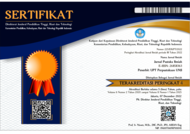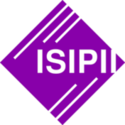- Focus and Scope
- Section Policies
- Peer Review Process
- Publication Frequency
- Open Access Policy
- Publication Ethics
- Plagiarism
- Archiving
- Journal History
Focus and Scope
Jurnal Pustaka Ilmiah presents up-to-date information on the research results in the field of library management, organization of information, information services, digital library and repositories, IT, media and information literacy, knowledge management, information and media preservation, documentation system, archive management and informetrics (scholarly communication).
Informetrics (scholarly communication). The use of mathematical and statistical methods in research related to libraries, documentation, and information.
Section Policies
Articles
Peer Review Process
The articles submitted to Jurnal Pustaka Ilmiah will be processed through a formatting review by the editor and independently reviewed by two peer reviewers. The review process applies the Double-Blind method. Decisions from reviewers are a top priority for editors to make decisions. The time required by reviewers to complete a round review process is three weeks. Generally, prospective reviewers will be selected based on their reputation in the suitability of their expertise. The decision for publication, amendment, or rejection is based on their reports/recommendations. After being reviewed, there will be four kinds of editor decisions based on reviewers’ recommendations:
> Accept Submission: The submission will be accepted without revisions.
> Revisions Required: The submission will be accepted after minor changes have been made.
> Resubmit for Review: The submission needs to be re-worked, but with significant changes, may be accepted. It will require a second round of review, however.
> Decline Submission: The submission will not be published in the journal.
Publication Frequency
Jurnal Pustaka Ilmiah publishes two issues in a year (June and December)
Open Access Policy
This journal provides immediate open access to its content on the principle that making research freely available to the public supports a greater global exchange of knowledge.
Publication Ethics
Jurnal Pustaka Ilmiah is a journal that is professionally managed by Sebelas Maret University by upholding the copyright, privacy, license, and ethics of scientific publications. Every article that is published in Jurnal Pustaka Ilmiah gives a significant scientific impact on the reader because it prioritizes aspects of renewal, authenticity, and expediency.
The publication ethics below are the main principles and foundations in journal publication, which regulate the ethics of author, editor, reviewer, and journal manager. We hope that by understanding and implementing this scientific publication, every article that is published in this journal can avoid all forms of malpractice publication band copyright infringement, such as duplication, fabrication, falsification, and plagiarism.
Author Ethic
- Reporting; the author should report the process and results of their research fairly, clearly, precisely, accurately, thoroughly, and impartially as well as save the data well. Honesty is expected in presenting any data and information listed in content and research results.
- Originality; the author makes a statement that the paper submitted to the journal editor is original (from the author's own ideas), has never been delivered and published in any media, in any language, and is not in the process of submission to another publisher. In the case of publication duplication and deception, the article is subject to be removed from this journal.
- Clear sources; the author should mention and ensure that any reading materials used as citations and bibliography are written clearly and completely. The author is strictly forbidden to quote the writings of others without citing the original source.
- Responsibility; the author is fully responsible for the data and research writings, in terms of methods, analysis, calculation, and details. If verification is required from the editor and reviewer, the author is willing to answer it clearly, precisely and fairly.
- Agreement; author ensures that the names listed in the article are based on contributions of ideas and thoughts of every author and have been approved by the entire team of authors. Any changes, reductions or additions of author names, should be approved by the team of authors. Any other parties contributing fully ( non-substance ) in writing this paper, the author expresses their gratitude to the relevant parties.
- Punctuality; author revises and edits the manuscript punctually for the sake of discipline and regular journal publication. Otherwise, the author is ready to take the consequences, which is the delay of journal article publication.
- Disclosure of conflicts of interest; author upholds copyright and privacy of one another to avoid conflicts of interest. In the event of a conflict of interest with other parties, the author must solve it justly and wisely.
Editor Ethic
- Neutrality; the editor is neutral in selecting and screening manuscripts. The editor must be objective and fair to every author who submitted their written works. The editor is forbidden to be discriminative to the author in terms of gender, ethnicity, religion, race, intergroup, or nationality.
- Reporting; editor reports the selection and reviews scripts clearly and accurately to the author based on accuracy, completeness, and clarity of reporting of result research and its development, including editing techniques and the use of guidelines for publication and screenwriting.
- Communicative; editor communicates effectively and efficiently in the process of publishing the journal. Every suggestion and criticism from the author, reviewer, and journal manager should be addressed clearly, fairly and transparently.
- Fairness; editor distributes the manuscript to editor team members and reviewers fairly based on their respective competence.
- Professional; editor works professionally based on his duties and responsibilities. The editor should understand any policy related to journal publication. The editor ensures that every script has undergone the editorial process and review correctly, fairly, and objectively.
- Responsibility; editor takes full responsibility for the success of journal publication. Editor guarantees that every journal article published is a new paper and not a copy, and gives benefits to those reading and accessing the journals.
- Disclosure of conflicts of interest; editor upholds copyright and privacy of each other to avoid conflict of interest. Should a conflict of interest arise with other parties, an editor must solve it justly and wisely.
Reviewer Ethic
- Neutrality; the reviewer is fair, objective, unbiased, independent, and only in favour of scientific truth. The script review process is carried out professionally without distinguishing the author’s background. Reviewer is prohibited to conduct a review of papers involving himself, either directly or indirectly.
- Professional; reviewer should be critical and professional in assessing a paper (related to his expertise), open about new things, able to keep the secret of the things being assessed, not take personal advantage of the paper he assesses, as well as has a passion for improving written works. The reviewer has the right to refuse a script if it does not correspond to his expertise. He then can recommend it to the other more competent reviewer in accordance with the scope of the publication.
- Quality assurance; reviewer has a duty to assist the editor in improving the quality of the paper he reviews. The reviewer analyzes papers on the substance not on grammar, punctuation, and typos. The reviewer is required to uphold the basic principles and scientific analysis in the process of reviewing a paper. The reviewer works on the principle of truth, novelty, and originality; prioritizes the benefit of the paper for the development of science, technology, and innovation; as well as understands the impact of paper on the development of science.
- Punctuality; reviewer reviews the manuscript and gives a response to the editor quickly, expected to be on time. If the time is not enough, the reviewer then informs the editor with a clear reason for the sake of discipline and regularity of journal publication.
- Disclosure of conflicts of interest; reviewer upholds copyright and privacy of each other in order to avoid conflicts of interest. Should a conflict of interest arise with other parties, the reviewer must finish it justly and wisely.
Journal Manager Ethic
- Decision-making; journal managers should define the vision, mission, and goals of the organization in journal publication based on the recommendation of the reviewer and the editorial board. To do so, journal managers are neutral and free from conflicts of interest of individuals or groups, business aspects, aspects of ethnicity, religion, race, and intergroup.
- Freedom; journal managers give freedom to the reviewer and editor to create harmony in the working atmosphere and mutual respect for one another in order to guarantee and protect intellectual property rights, particularly those related to the management of funds received from third parties. Journal managers encourage editors and reviewers to apply for ethics clearance including confidentiality, licensing, and special requirements in research on humans, animals, and other living creatures.
- Responsibility; journal managers are responsible for the guideline of journal publication policies, starting from the name of an issue, scientific scope, manuscript writing style, collaboration, licensing and legal publications, and evaluation of manuscript publication.
- Promotion; journal managers promote and ensure the sustainability of journal publications. Journal managers are entitled to determine the funding in accordance with the policies and needs of journal publication. In its management, funders do not intervene in terms of issue substance. The Source of the research and development funds is included in the publication without affecting the reader's perception.
- Disclosure of conflicts of interest; journal manager upholds copyright and privacy of each other to avoid conflicts of interest. In the event of a conflict of interest with other parties, journal managers must finish it justly and wisely.
Plagiarism
Authors should submit only original work that is not plagiarized and not has been published or being considered elsewhere. Turnitin or other software will be used by the editorial team to check for similarities between a submitted manuscript with existing literature.
All work in the manuscript should be free of any plagiarism, falsification, fabrications, or omission of significant material. Jurnal Pustaka Ilmiah Editorial Board will ensure that every published article will not exceed the 30% similarity Score. Plagiarism screening will be conducted by Jurnal Pustaka Ilmiah Editorial Board using Turnitin
Archiving
This journal utilizes the LOCKSS system to create a distributed archiving system among participating libraries and permits those libraries to create permanent archives of the journal for purposes of preservation and restoration. More...
Journal History
Jurnal Pustaka Ilmiah was first published in December 2015. The journey to reach the age of 4 years of publishing in print, then in 2019, an online version was released through OJS. Since then, the JPI journal has been published in two versions, namely print and online.




.png)
.png)









1.jpg)

